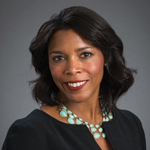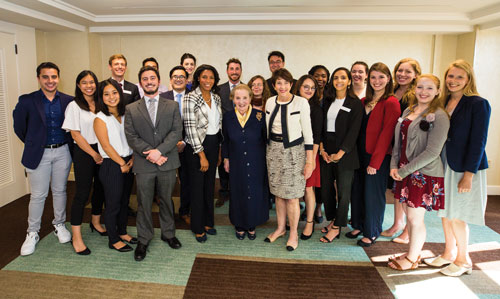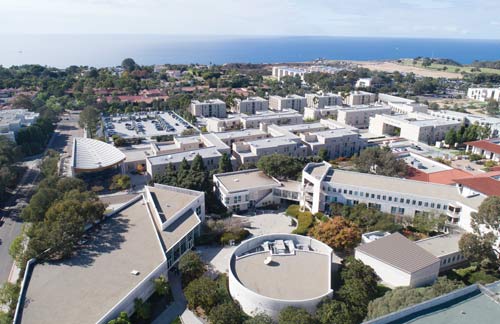2020 Leaders in Graduate Education
THIS GUIDE IS NO LONGER ACTIVE. For the current FP Guide, click here.
Renee Bowen, Director, Center for Commerce and Diplomacy
UC San Diego, School of Global Policy and Strategy
In an increasingly interconnected world economy pocked by trade wars, redesigning globalization is the ambitious but timely goal of a new center at UC San Diego’s School of Global Policy and Strategy (GPS).
The backlash against globalization stemming from populism means that it is now even more important to finetune the organizations that help countries cooperate economically, says the director of the new Center for Commerce and Diplomacy, Renee Bowen. The center will focus on research into the intersection of public policy and economics, bring together practitioners to think about how to improve cooperation, and train a cadre of future commercial diplomats who will be the foot soldiers of international commerce.

“The aim of the center is to study the institutions of global economic cooperation. There needs to be more dialogue between business, government, and academia to get at the problems and the solutions.” –Renee Bowen, Director, Center for Commerce and Diplomacy, School of Global Policy and Strategy, UC San Diego
“There is no better time to be thinking about international trade agreements,” says Bowen, who is also an associate professor of economics. She teaches courses focused on political economic theory, international economics, and international trade agreements—sometimes using game theory to help students understand what makes trade agreements sustainable.
“The aim of the center is really to study the institutions of global economic cooperation,” says Bowen, who worked at the World Bank and received her PhD from Georgetown University.
 Her passion is understanding how organizations such as the World Bank Group, the World Trade Organization, and the International Monetary Fund support the global economic order and how they can be improved. “At the heart of this, there needs to be more dialogue between business, government, and academia to really get at the problems and the solutions,” she says.
Her passion is understanding how organizations such as the World Bank Group, the World Trade Organization, and the International Monetary Fund support the global economic order and how they can be improved. “At the heart of this, there needs to be more dialogue between business, government, and academia to really get at the problems and the solutions,” she says.
The Center for Commerce and Diplomacy, which launched in January 2019, aims to accomplish that goal through research, seminars, and public outreach. For example, former Secretary of State Condoleezza Rice was the speaker at the first Global Leaders Forum for the center in 2019.
In addition, the center has helped lead a pioneering teaching approach for the school by jointly creating a course on economic diplomacy with Sciences Po’s Paris School of International Affairs, HEC Montréal, and the Korea University Graduate School of International Studies in Seoul. Students on three continents will take the course simultaneously, using course materials developed by all four schools. This approach is designed to provide a common understanding to future diplomats who could negotiate trade deals together. “They have a common background, they will speak a common language, and will make that diplomatic transition much stronger,” says Bowen. The students will compete for a coveted internship at the Paris-based Organisation for Economic Co-operation and Development.
 The Center for Commerce and Diplomacy, Bowen says, is a natural outgrowth for a school that has long focused on China, and more broadly, relationships between the Americas and Asia. One of the school’s program options is a Master of Chinese Economic and Political Affairs.
The Center for Commerce and Diplomacy, Bowen says, is a natural outgrowth for a school that has long focused on China, and more broadly, relationships between the Americas and Asia. One of the school’s program options is a Master of Chinese Economic and Political Affairs.
About 40 percent of GPS degree-seeking students come from abroad. Some return to their home countries after graduation for private-sector or government jobs, such as at the Ministry of Economy, Trade, and Industry in Japan. Other graduates find jobs with private companies such as Qualcomm. Students intern all over the world, including at the United Nations, the Mitsubishi Research Institute in Tokyo, and the US Department of State.
Graduate Degree Program Options
- Master of Chinese Economic and Political Affairs
- Master of International Affairs
- Master of Public Policy
- Master of Advanced Studies in International Affairs (executive degree)
- PhD joint program, International Relations and Political Science
Visit the Request Info page to receive more information.
Contents
- 2020 Leaders in Graduate Education
- Johns Hopkins School of Advanced International Studies
- UC San Diego, School of Global Policy and Strategy
- Indiana University, Hamilton Lugar School of Global and International Studies
- NYU School of Professional Studies, Center for Global Affairs
- Tufts University, The Fletcher School
- University of Kent, Brussels School of International Studies
- Columbia University, School of International and Public Affairs (SIPA)
- University of Texas at Austin, LBJ School of Public Affairs

